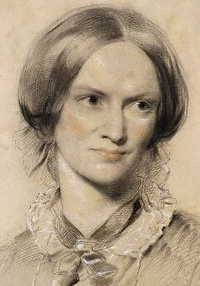
Charlotte Brontë was an English novelist and poet, the eldest of the three Brontë sisters who survived into adulthood and whose novels became classics of English literature.
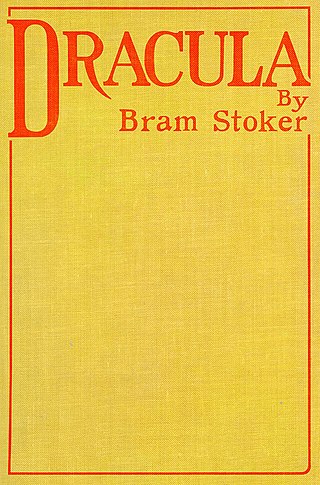
Dracula is a novel by Bram Stoker, published in 1897. An epistolary novel, the narrative is related through letters, diary entries, and newspaper articles. It has no single protagonist, but opens with solicitor Jonathan Harker taking a business trip to stay at the castle of a Transylvanian nobleman, Count Dracula. Harker escapes the castle after discovering that Dracula is a vampire, and the Count moves to England and plagues the seaside town of Whitby. A small group, led by Abraham Van Helsing, hunt Dracula and, in the end, kill him.

Emily Jane Brontë was an English novelist and poet who is best known for her only novel, Wuthering Heights, now considered a classic of English literature. She also published a book of poetry with her sisters Charlotte and Anne titled Poems by Currer, Ellis and Acton Bell with her own poems finding regard as poetic genius. Emily was the second-youngest of the four surviving Brontë siblings, between the youngest Anne and her brother Branwell. She published under the pen name Ellis Bell.

Gothic fiction, sometimes called Gothic horror, is a loose literary aesthetic of fear and haunting. The name refers to Gothic architecture of the European Middle Ages, which was characteristic of the settings of early Gothic novels.

Ursula Kroeber Le Guin was an American author best known for her works of speculative fiction, including science fiction works set in her Hainish universe, and the Earthsea fantasy series. She was first published in 1959, and her literary career spanned nearly sixty years, producing more than twenty novels and over a hundred short stories, in addition to poetry, literary criticism, translations, and children's books. Frequently described as an author of science fiction, Le Guin has also been called a "major voice in American Letters". Le Guin said she would prefer to be known as an "American novelist".
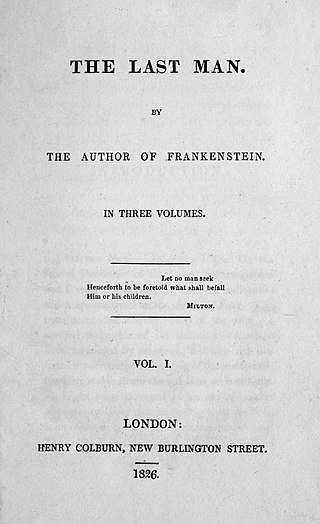
The Last Man is an apocalyptic, dystopian science fiction novel by Mary Shelley, first published in 1826. The narrative concerns Europe in the late 21st century, ravaged by the rise of a bubonic plague pandemic that rapidly sweeps across the entire globe, ultimately resulting in the near-extinction of humanity. It also includes discussion of the British state as a republic, for which Shelley sat in meetings of the House of Commons to gain insight to the governmental system of the Romantic era. The novel includes many fictive allusions to her husband Percy Bysshe Shelley, who drowned in a shipwreck four years before the book's publication, as well as their close friend Lord Byron, who had died two years previously.
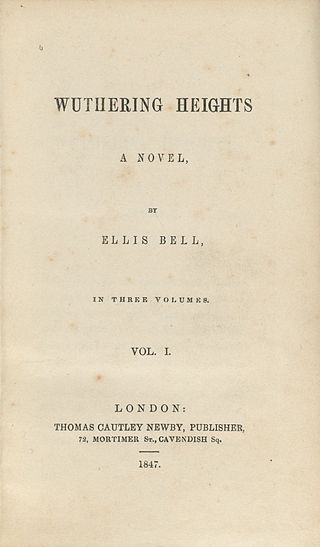
Wuthering Heights is an 1847 novel by Emily Brontë, initially published under her pen name "Ellis Bell". It concerns two families of the landed gentry living on the West Yorkshire moors, the Earnshaws and the Lintons, and their turbulent relationships with the Earnshaws' foster son, Heathcliff. The novel was influenced by Romanticism and Gothic fiction.

Ann Radcliffe was an English novelist and a pioneer of Gothic fiction. Her technique of explaining apparently supernatural elements in her novels has been credited with gaining respectability for Gothic fiction in the 1790s. Radcliffe was the most popular writer of her day and almost universally admired; contemporary critics called her the mighty enchantress and the Shakespeare of romance-writers, and her popularity continued through the 19th century. Interest has revived in the early 21st century, with the publication of three biographies.
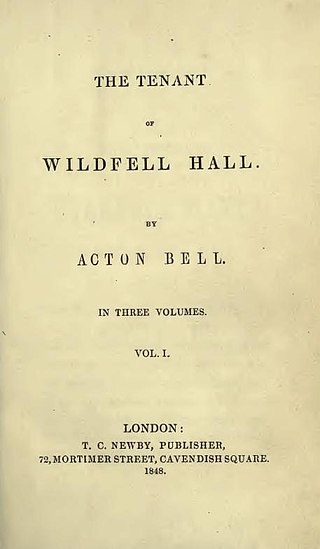
The Tenant of Wildfell Hall is the second and final novel written by English author Anne Brontë. It was first published in 1848 under the pseudonym Acton Bell. Probably the most shocking of the Brontës' novels, it had an instant and phenomenal success, but after Anne's death her sister Charlotte prevented its re-publication in England until 1854.

The Brontës were a nineteenth-century literary family, born in the village of Thornton and later associated with the village of Haworth in the West Riding of Yorkshire, England. The sisters, Charlotte (1816–1855), Emily (1818–1848) and Anne (1820–1849), are well-known poets and novelists. Like many contemporary female writers, they published their poems and novels under male pseudonyms: Currer, Ellis, and Acton Bell. Their stories attracted attention for their passion and originality immediately following their publication. Charlotte's Jane Eyre was the first to know success, while Emily's Wuthering Heights, Anne's The Tenant of Wildfell Hall and other works were accepted as masterpieces of literature after their death.
Alice Ann Munro is a Canadian short story writer who won the Nobel Prize in Literature in 2013. Munro's work has been described as revolutionizing the architecture of short stories, especially in its tendency to move forward and backward in time. Her stories have been said to "embed more than announce, reveal more than parade."
The fantastic is a subgenre of literary works characterized by the ambiguous presentation of seemingly supernatural forces.
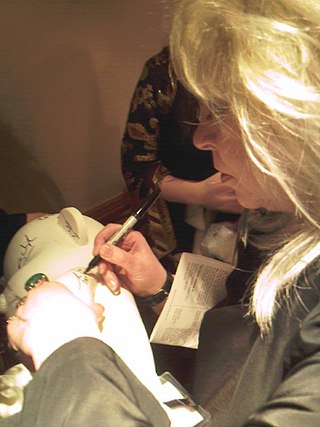
Tanith Lee was a British science fiction and fantasy writer. She wrote more than 90 novels and 300 short stories, and was the winner of multiple World Fantasy Society Derleth Awards, the World Fantasy Lifetime Achievement Award and the Bram Stoker Award for Lifetime Achievement in Horror. She also wrote a children's picture book, and many poems. She wrote two episodes of the BBC science fiction series Blake's 7. She was the first woman to win the British Fantasy Award best novel award, for her book Death's Master (1980).
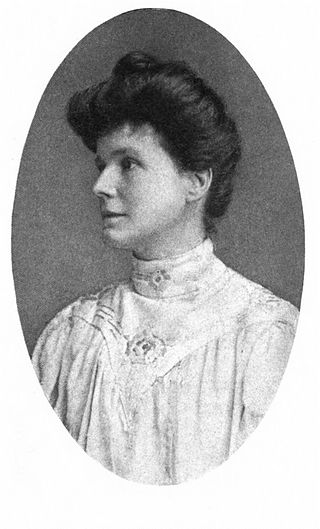
May Sinclair was the pseudonym of Mary Amelia St. Clair, a popular British writer who wrote about two dozen novels, short stories and poetry. She was an active suffragist, and member of the Woman Writers' Suffrage League. She once dressed up as a demure, rebel Jane Austen for a suffrage fundraising event. Sinclair was also a significant critic in the area of modernist poetry and prose, and she is attributed with first using the term 'stream of consciousness' in a literary context, when reviewing the first volumes of Dorothy Richardson's novel sequence Pilgrimage (1915–1967), in The Egoist, April 1918.
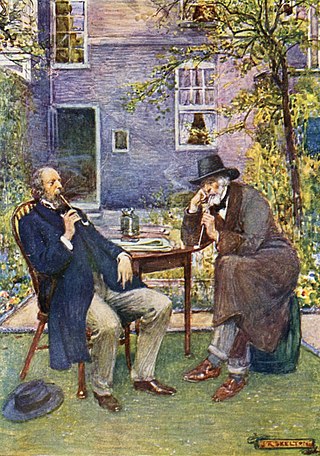
Victorian literature refers to English literature during the reign of Queen Victoria (1837–1901). The 19th century is considered by some to be the Golden Age of English Literature, especially for British novels. It was in the Victorian era that the novel became the leading literary genre in English. English writing from this era reflects the major transformations in most aspects of English life, from scientific, economic, and technological advances to changes in class structures and the role of religion in society. Famous novelists from this period include Charles Dickens, William Makepeace Thackeray, the three Brontë sisters, Elizabeth Gaskell, George Eliot, Thomas Hardy, and Rudyard Kipling.
Lee Smith is an American fiction writer who often incorporates her background from the American South in her works. She has received many writing awards, such as the O. Henry Award, the American Academy of Arts and Letters Award for Fiction, and the North Carolina Award for Literature. Her novel The Last Girls was listed on the New York Times bestseller's list and won the Southern Book Critics Circle Award.
"The Romance of Certain Old Clothes" is a short story by American-British author Henry James, written in February 1868 and first published in The Atlantic Monthly. The original debut was in Volume 21, Issue 124. James later made some revisions, including changes to the family name and eldest daughter when he published the story in the UK in 1885. It has been included in several anthologies, including American Gothic Tales, edited by Joyce Carol Oates.
Kim Echlin is a Canadian novelist, translator, editor and teacher. She has a PhD in English literature for a thesis about the translation of the Ojibway Nanabush myths. Echlin has worked for CBC Television and several universities. She currently works as a creative writing instructor at the University of Toronto School for Continuing Studies. Her 2009 novel, The Disappeared, featured on the shortlist for the 2009 Scotiabank Giller Prize.

Emily is a 2022 British biographical drama film written and directed by Frances O'Connor in her directorial debut. It is a part-fictional portrait of English writer Emily Brontë, concentrating on a fictional romantic relationship with the young curate William Weightman. Fionn Whitehead, Oliver Jackson-Cohen, Alexandra Dowling, Amelia Gething, Adrian Dunbar and Gemma Jones also appear in supporting roles.

The type of romance considered here is mainly the genre of novel defined by the novelist Walter Scott as "a fictitious narrative in prose or verse; the interest of which turns upon marvellous and uncommon incidents", in contrast to mainstream novels which realistically depict the state of a society. These works frequently, but not exclusively, take the form of the historical novel. Scott's novels are also frequently described as historical romances, and Northrop Frye suggested "the general principle that most 'historical novels' are romances". Scott describes romance as a "kindred term", and many European languages do not distinguish between romance and novel: "a novel is le roman, der Roman, il romanzo".















